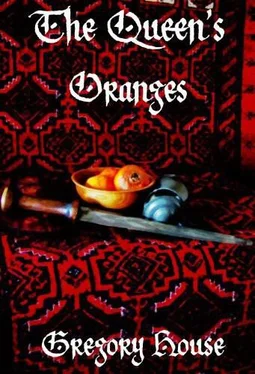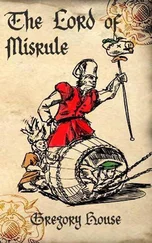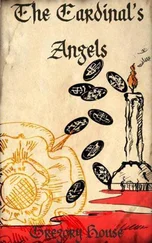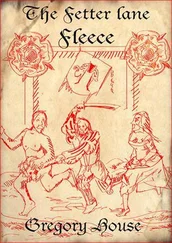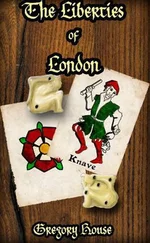Gregory House - The Queen's Oranges
Здесь есть возможность читать онлайн «Gregory House - The Queen's Oranges» весь текст электронной книги совершенно бесплатно (целиком полную версию без сокращений). В некоторых случаях можно слушать аудио, скачать через торрент в формате fb2 и присутствует краткое содержание. Жанр: Исторический детектив, на английском языке. Описание произведения, (предисловие) а так же отзывы посетителей доступны на портале библиотеки ЛибКат.
- Название:The Queen's Oranges
- Автор:
- Жанр:
- Год:неизвестен
- ISBN:нет данных
- Рейтинг книги:5 / 5. Голосов: 1
-
Избранное:Добавить в избранное
- Отзывы:
-
Ваша оценка:
- 100
- 1
- 2
- 3
- 4
- 5
The Queen's Oranges: краткое содержание, описание и аннотация
Предлагаем к чтению аннотацию, описание, краткое содержание или предисловие (зависит от того, что написал сам автор книги «The Queen's Oranges»). Если вы не нашли необходимую информацию о книге — напишите в комментариях, мы постараемся отыскать её.
The Queen's Oranges — читать онлайн бесплатно полную книгу (весь текст) целиком
Ниже представлен текст книги, разбитый по страницам. Система сохранения места последней прочитанной страницы, позволяет с удобством читать онлайн бесплатно книгу «The Queen's Oranges», без необходимости каждый раз заново искать на чём Вы остановились. Поставьте закладку, и сможете в любой момент перейти на страницу, на которой закончили чтение.
Интервал:
Закладка:
That had really fired up the conflict, since at the time the parliament was in a savage mood, eager to trim clerical arrogance. As a consequence of claiming common law precedence, Hunne was arrested by Bishop Tunstall and lodged in the city Lollard’s Tower at St Paul’s. It was there that the blackening of More’s reputation began. Hunne was found dead in his cell the next day. Apparently he had ‘hung himself” in remorse, regret and despair or so claimed More, most recently in a tract slamming Simon Fish’s recent complaint against the clergy. No one believed it then or now, and a London inquest decided that the gaolers had killed Hunne on instructions from superiors-the Bishop’s chancellor, Dr Horsley no less.
More was brought in to defend the Church and he was ‘shocked’ to discover that when Hunne’s possessions were investigated, an English translation of the Bible was found, complete with extensive margin notes denying the validity of the Mass. Strangely this massive tome and four others were said to have been found in the dead man’s cell in the Lollard tower. How a large locked box full of heretical texts escaped notice by all the Bishop’s servants and gaolers was never explained. As a consequence the draper’s body was tried as a heretic, condemned, and that week burnt at Smithfield. But that was not all. As a convicted heretic the Church, by rights, seized all the deceased’s possessions to the value of ten thousand pounds.
And More, for his defence, was given a cut of the proceeds and gained an unsavoury reputation for creating facts and evidence, as well as an introduction to the potential profits of heretic hunting. It was a dubious history that the city was now forced to take into account when dealing with the new Lord Chancellor.
In light of these possible levers, Ned shifted onto another fertile patch of legal revenue. “Upset any business rivals or disgruntled relatives recently?”
He had actually meant it as a lighter suggestion after dragging up the Londoner’s smouldering resentment about the Hunne murder. But it appeared that it was taken a good deal more seriously. Meg adopted that deeply introspective look of hers as if she was chewing over a particularly bitter herb. “There is a continuing difficulty with a couple of aunts. They have threatened to take a dispute to court. That could be one.”
It sounded a reluctant admission and from what Ned recalled, on their first meeting Meg had claimed that the estate had been settled and there was no need for the meddling of lawyers. Apparently that wasn’t so. There was nothing like a prosperous estate to draw the vultures, though frequently monetary value had little to do with the rancour engendered in family battles. He’d heard of one bitter dispute between cousins that raged for years in the courts, over a scrap of land barely large enough to support a cow. It must have cost the equal to a hundred acres by the time it went through appeals, petitions and judgements.
But could blood or family throw their kin to the wolves? Having seen what he had, Ned had no doubt that such actions would be accounted merciful when weighed against years of perceived insult or degradation at family gatherings. After all there was nothing like cheek by jowl association to build up a really good generation encompassing loathing. From the bleak look of despair on Meg Black’s face perhaps this was not the best line to pursue.
Ned thought it might be more instructive to plunge into another area of interest as a distraction. “What can you tell me about the way you trade with this vessel and cargo?”
That certainly distracted her. Rather than worrying about renegade members of her family, Meg now looked at him as if he had spouted horns, a tail and went moo. “Why do you want to know?” she asked suspiciously.
This, he suspected, was another touchy subject. “Because despite the obvious interest of Sir Thomas More, we still have no reason for the murders, and I still feel that we are missing something here.”
Margaret Black displayed a great reticence to when it came to divulging the mystical intricacies of the smugglers craft. Ned had made no move to leave and was just stood in place, smiling patiently. This was one skirmish he was going to win.
Eventually after a few attempts at further frowning intimidation and a long glaring silence, Meg Black gave a frustrated sigh and yielded to his question. “So be it, Ned.”
If you gave coin for reluctance, Meg Black would be richer by a hundred angels. He ignored the tone and gave a small courtly bow as a concession to her compliance.
A twitched, sceptical eye brow was its only acknowledgement. “As I’ve already said, all cargo has to pass through the customs house, where the collectors and their clerks weigh and evaluate the cargo for taxes and duties.”
“What? Everything on the ship?On every ship?” Ned was more than surprised. That was a pretty tall order for so few officials and so much cargo. He did a quick calculation. There must be forty ships arriving or leaving here every day.
Meg’s frown eased as she continued the explanation. “Yes. The controller of customs has two more sets of retainers. One inspects the ships at the docks and they’re called land-waiters. The second are down Gravesend way and they row out to the ships to check that nothing extra has been picked up or dropped off in the estuaries near Greenwich or Tilbury, along the way. They’re the tide-waiters.”
For the second time since he’d arrived Ned noticed how her blue grey eyes sparkled when she wasn’t frowning. His better angel made a pointed reminder about the business at hand and Ned only slightly guiltily asked his next question. “So what happens once the customs men have had a look at the cargo? What are they after?”
“Officially they search for any banned items that aren’t covered in the purchased exemption issued by a royal officer in accordance with the statutes. Like the grain importing during February.”
Oh yes he remembered that little scam, the ever lucrative royal licences. “So even if it isn’t wheat or oats, you still have to buy a right to ship your cargo?” To Ned that sounded bizarre.
“No Ned, not quite. This is how it works. This vessel is to sail to Bristol and discharge half its cargo. Then according to arrangements already made, one of the local merchant’s will load fifty dickers of leather hides. That is fifty bundles of ten. But before that, he would have to pay thirteen shillings for the licence per dicker and he would have to buy the hides at forty to fifty shillings a dicker.”
Ned was aghast. That was a quarter of the cost added as a duty. “By sweet Jesu, that’s expensive!”
Meg Black shook her head and gave him a questioning frown, as if he’d fallen for the simplest cozener’s play at a market stall. “Of course it would be! If a merchant paid for a licence for everything, they’d soon find themselves in prison for debt.”
Then she adopted what Ned normally thought of as her ‘the cat who’d got the cream’ smile. “What we do is simple. We form an association to buy a licence exactly like we did for the grain. Then we stretch the coverage, so that instead of fifty dickers of hide we would ship a few hundred.”
Ahh thought, Ned, the cony-catchers trick. Watch the right hand while the left changes the dice. “What about all the customs officers? Wouldn’t they be able to check? It seems like a very simple matter to poke your head in the hold and match up numbers.”
At his question Meg Black gave one of her supercilious knowing smiles and shook her head. “No it isn’t. Remember Ned, most of the customs officers are merchants as well, and although land and tide waiters are supposed to get a reward for any contraband they find, well…”
Читать дальшеИнтервал:
Закладка:
Похожие книги на «The Queen's Oranges»
Представляем Вашему вниманию похожие книги на «The Queen's Oranges» списком для выбора. Мы отобрали схожую по названию и смыслу литературу в надежде предоставить читателям больше вариантов отыскать новые, интересные, ещё непрочитанные произведения.
Обсуждение, отзывы о книге «The Queen's Oranges» и просто собственные мнения читателей. Оставьте ваши комментарии, напишите, что Вы думаете о произведении, его смысле или главных героях. Укажите что конкретно понравилось, а что нет, и почему Вы так считаете.
